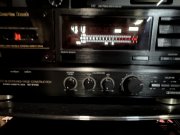overmodulated
Journeyman
I understand what you're saying, but some machines count out hours minutes and seconds. Like my A&D GX-Z9100 counts out perfect minutes every time, and when I get done with one side of a 90 minute tape it always lands on 45-46 minutes. So I know there's no way that's revolutions but I get it, and some decks it is as you say.

